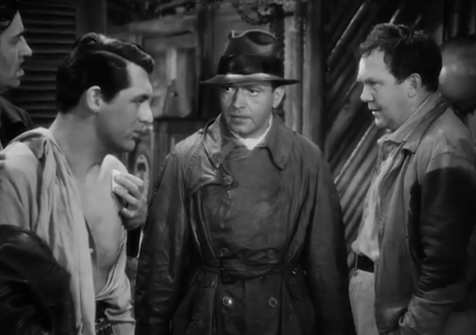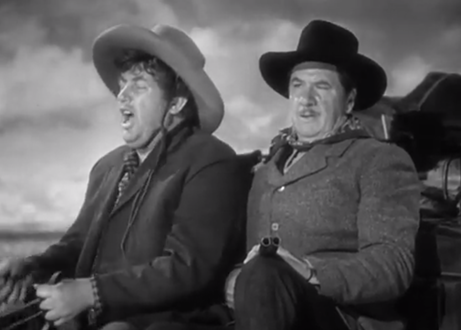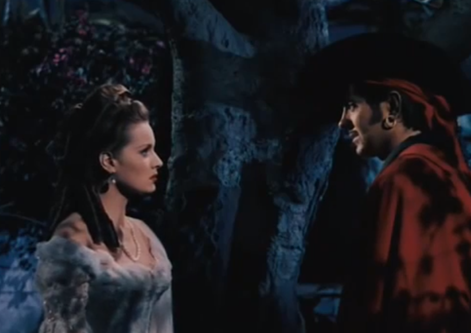
The Lynfield Bugle, led by their fearless leader Jed Waterbury (Thomas Mitchell), keeps their nose to the proverbial grindstone printing the news as it happens in “The Biggest Little Town in Connecticut.”
Their latest act of rebellion constitutes printing a spread from the latest lurid bestseller from author Caroline Adams. It causes quite the to-do in such a proper, God-fearing community.
Because it’s true Lynfield has all the customary facets of a town its size, including emblematic moral watchdogs such as Rebecca Perry (Spring Byington), a key member in the Lynfield Literary Circle, the key force in swaying public opinion and consequently, keeping the town’s gossip in a state of constant flux. Rebecca just happens to be the most insufferable of them all.
With their mouths, they openly condemn Adam’s latest piece of titillating prose as they secretly relish its vivid detailings of passionate romance. One of their younger members, who sits zealously by, next to her two austere aunties (Elisabeth Risdon & Margaret McWade), is Theodora Lynn (Irene Dunne). She’s a devoted Sunday School teacher and plays the organ at church on a weekly basis.
Theodora also has a secret in the form of a pen name and a mendacious life as a writer, although that is rather harsh because this is Irene Dunne we’re talking about in a generally raucous screwball comedy. You see, she is the one and only Caroline Adams!
Her Uncle John is the so-called black sheep of the family (Robert Grieg) because he escaped the puritanical lives of his sisters for a much more “worldly” life in the city. He’s a jolly fellow and with a twinkle in his eye, he believes Theodora to be different. There’s still hope for her yet.
In fact, she has a streak in her that old Uncle John might just be downright proud of. It’s a decent streak mind you — helping a young woman be with her husband and setting her up with her job — but it’s the kind of activity people back home might turn their nose at. This all happens as she makes a meeting with her publisher incognito to talk business as part of her double life.
Although he does his best to keep her under wraps, that miracle elixir: whiskey has a habit of loosening the tongue. Their prying dinner companions are fascinated by the very contradictory nature of her character. Among them is a wry ne-er-do-well, Michael Grant (Melvyn Douglas). Soon the small-town gal finds herself in a fairly big city situation, in Grant’s bachelor pad, with deeply comic underpinnings.
Of course, nothing happens at first. That is until Theodora, that is Caroline Adams, has her cover blown — an old friend wanders through town quite by chance, with a furry companion Jake. He railroads his way into the aunties’ shed as a gardener and quickly sets up shop. As he sees it, he’s her deliverance from the clutches of her town, and he gleefully whistles his way into her life, tearing up their gardens backward and forwards.
She has very little in the form of a rebuttal aside from retaliating through a song of her own, “Be Still My Heart” through gritted teeth. This could be the end of the movie right there or else it wouldn’t have enough gas to wheeze its way to the finish. In this specific moment, it’s not what I would term a screwball in the strictest sense though, it does have a feel of some of the Loy and Powell comedies of the same vintage. Be it Libeled Lady, Love Crazy, or I Love You Again.

Mervyn Douglas often feels like a version of Powell I don’t take a shining too quite as much. He has a similar playful banter at his disposal, even mustachioed good looks, but it doesn’t tickle the fancy in the same way — at least for me.
Irene Dunne, of course, in her first foray into out-and-out comedy is exquisite, although she would continue to up the ante with the likes of The Awful Truth, arguably her best film and the finest pairing she ever had with Cary Grant (or anyone for that matter).
But we must attend to this story because it doesn’t end right off, instead, it turns the tale on its head and once Theodora has been handily liberated of her small-town’s repressiveness, it gives her the freedom to have a go at Michael. Because it turns out they’re not all that different. He needs his own push of encouragement.
Instead of church choirs, temperance, and women’s book clubs, it involves high society, governorships, and public appearances. His father expects him to keep out of the newspapers and remain married to his estranged wife — at least until the public office is secured. Meanwhile, Michael becomes unhappier by the hour.
Dunne takes the movie by the horns now and truly kicks it into overdrive right when it could use a good jolt. The way she trollops and sashays around, first through her lover’s bachelor pad, and then making her way up the totem pool on the dance floor, with her new pal the governor, is the picture of jovial inhibition. She redefines our perceptions and the underlining dynamics of the movie shift wildly — and humorously — as a result of her antics.
She goes back to her publisher in fancy new duds absolutely gobsmacking him as she proceeds to drum up all the publicity she possibly can. Theodora Lynn is going to become a household name. Accordingly, she gets the newsboys in her corner, and they go to great lengths to help her (and themselves).
Soon she’s plastered over the front pages, and the ever-fastidious Bugle gets the scoop out. Like clockwork, the town is shaken into an uproar, and it even reaches the upper echelons too as Michael gets dragged into it. What a beautiful mess; just what the movie required to spruce it up. Theodora’s making waves like never before.
The key is how Dunne always has a firm handle on everything — turning the sass on and off as needed — she knows what she’s doing. Whereas other heroines are often dizzy and ditzy, like frantic hurricanes of passion and emotion, she’s probably the most controlled of all of them even as she does bring her own “wildness” to the party.
What’s even more hilarious is watching public opinion rise up like wildfire and turn in her favor. She gets as good a homecoming as the war heroes in Hail The Conquering Hero a few years down the line. All her decency and newfound transparency are met with affection.
By now, she’s harnessed the power of her neighborhood and finds a way to be a beacon of change in an uproarious manner with a romance to complement the major strides in her personal life.
As such, Theodora Goes Wild becomes a surprisingly pointed (and poignant) portrait of a young woman casting off the shackles of religious hypocrisy, societal repression, and general small-mindedness, all conveniently wrapped up in a quasi-screwball, rom-com format.
3.5/5 Stars












 The opening credits roll and recognition comes with each name that pops on the screen. Jean Arthur, James Stewart, Claude Rains, Edward Arnold, Guy Kibbee, Thomas Mitchell, Eugene Palette, Beulah Bondi, H.B. Warner, Harry Carey, Porter Hall, Charles Lane, William Demarest, Jack Carson, and of course, Frank Capra himself.
The opening credits roll and recognition comes with each name that pops on the screen. Jean Arthur, James Stewart, Claude Rains, Edward Arnold, Guy Kibbee, Thomas Mitchell, Eugene Palette, Beulah Bondi, H.B. Warner, Harry Carey, Porter Hall, Charles Lane, William Demarest, Jack Carson, and of course, Frank Capra himself. “Heathens are not always low just as Christians are not always high.” – Gregory Peck as Father Chilsum
“Heathens are not always low just as Christians are not always high.” – Gregory Peck as Father Chilsum



